Author: Rhythm Worker
After dawn, history will come.
The fate of Bitcoin and the US White House election seem to have never been so closely intertwined. Since the end of October, Trump's winning rate on major prediction platforms has been declining, and Bitcoin has also been fluctuating. As the "hero" and "Bitcoin president" of the cryptocurrency circle, if Trump wins the election, what kind of explosion will the price of Bitcoin usher in? If he loses the election, what will happen to the cryptocurrency circle and Bitcoin?
As the election day draws near, let's take a look at the predictions of top traders and prepare a foolproof trading strategy.
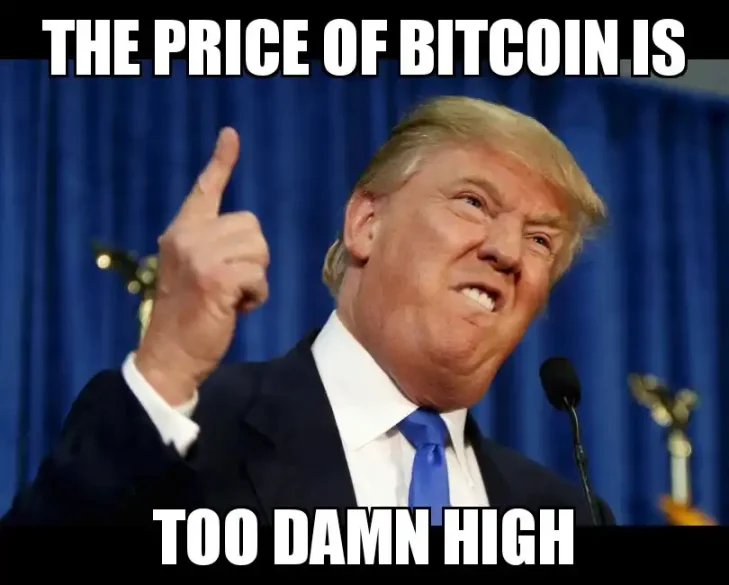
What do traders think about the future trend of Bitcoin?
PlanB: BTC is expected to reach $1 million by the end of 25
PlanB is the creator of the Bitcoin Stock-to-Flow (S2F) model and is well-known in the crypto industry for his unique model of the relationship between asset scarcity and price. His analysis looks at the growth potential of Bitcoin's long-term value, especially the price fluctuations after the halving event. His latest forecast points out that if Trump wins the upcoming presidential election, the Bitcoin market may usher in an unprecedented price surge. PlanB constructs a series of monthly timelines to show the direction of Bitcoin's price development under different market scenarios.
In the forecast a few months ago, PlanB gave specific values based on its own model S2F:
October: A classic month of skyrocketing, BTC reaches $70,000. PlanB predicts that the price of Bitcoin will see a strong rise in October. He believes that the surge in Bitcoin may be driven by increased volatility in the global market and the recovery of investor confidence, which is also the point in time when Bitcoin has shown price surges many times in history.
November: Trump wins the election, Bitcoin price reaches $100,000. If Trump wins the election, PlanB believes that Bitcoin will usher in a major turning point. He pointed out that Trump's coming to power may bring friendly policies to cryptocurrencies, thus ending the current Biden/Harris administration's "war" on cryptocurrencies, especially the policy checks and balances on senior regulators such as Gary Gensler and Elizabeth Warren, which will cause the price of Bitcoin to climb directly to $100,000.
December: ETF funds poured in, and Bitcoin soared to $150,000. PlanB believes that Trump's victory will clear the way for the approval of Bitcoin ETFs, and a large amount of funds are expected to flow into the market. The inflow of ETFs represents the acceptance and recognition of the mainstream financial market and the trust of investors, which will further push the price of Bitcoin to $150,000.
January 2025: Crypto returns to the US, Bitcoin climbs to $200,000. With the Trump administration's openness to cryptocurrency policies, a large number of crypto companies and investors may bring their businesses back to the US. PlanB expects this to have a significant market demand effect, pushing the price of Bitcoin to $200,000.
February 2025: The "Power Law" team takes profits and the price falls back to $150,000. The February pullback is a prediction of a Bitcoin market adjustment. PlanB believes that investors' profit-taking will cause Bitcoin to briefly fall back to $150,000 after hitting a high. However, this adjustment will be short-lived and necessary, laying a more stable foundation for the next stage of the rise.
March to May 2025: Bitcoin globalization trend, price breaks through $500,000. Starting in March, PlanB expects Bhutan, Argentina, Dubai and other countries to gradually use Bitcoin as legal tender, and starting in April, the United States will also start a strategic reserve of Bitcoin under the promotion of Trump. Then, in May, he believes that other countries, especially non-EU countries, will join this trend, causing Bitcoin to further climb to $500,000.
June 2025: AI boosts the price to $600,000. In June, PlanB proposed the hypothesis that AI will begin to autonomously participate in Bitcoin market arbitrage. He predicts that with the participation of AI in the Bitcoin market, this high-frequency trading will further drive the price up, causing Bitcoin to exceed $600,000.
July to December 2025: FOMO fades, price reaches $1 million. In the following months, PlanB believes that the market's FOMO sentiment begins to fade, and Bitcoin is expected to reach a new high of $1 million by the end of the year. At this point, Bitcoin has not only become a mainstream asset reserve, but also a must-have for global investors.
2026-2027: Market adjustment and bear market. In 2026, PlanB expects the price of Bitcoin to fall from $1 million to $500,000 and enter the distribution stage. By 2027, the market will enter a bear market and the price of Bitcoin is expected to drop to $200,000.
PlanB concluded that the key to this prediction lies in the scarcity value of Bitcoin. He pointed out that scarcity will become a core factor driving asset prices, just like scarce assets such as real estate and gold. PlanB believes that in the next 18 months, Bitcoin prices are expected to jump due to the halving effect and market demand, thereby continuing to consolidate its position as "digital gold" among global investors.
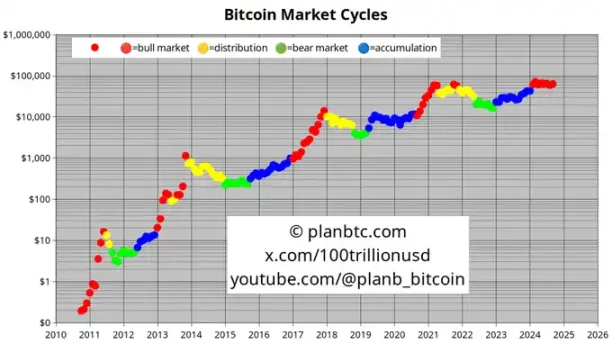
The key to PlanB's prediction is the scarcity value of Bitcoin. He pointed out that investors like scarcity, and there are basically three options for scarcity now: real estate (S2F 100, market value of $10 trillion), gold (S2F 60, market value of $20 trillion) or Bitcoin (S2F 120, market value of $1 trillion). Therefore, the scarcity of Bitcoin will become a core factor driving asset prices, just like scarce assets such as real estate and gold.
PlanB proposed the opposite scenario, that if Harris wins, he believes it will represent the "end of Western civilization" and continue to exacerbate the decline of the American empire. He expects the crypto industry to be further oppressed under the supervision of Gensler and Warren, continue more choke point actions, and may even face more stringent tax policies, such as the introduction of unrealized capital gains tax. However, he also emphasized that Bitcoin does not rely on a specific regulatory environment, and its value drive will still come from the global demand for scarcity.
Alex Krüger: BTC spot will be the main currency on election night
Alex Krüger, an Argentine economist, trader and consultant, believes that the election results will directly affect the direction of Bitcoin prices:
Trump wins: Bitcoin price target is $90,000 by the end of the year. Krüger estimates that if Trump wins, Bitcoin price will quickly reach $90,000 by the end of the year, giving a 55% probability of realization. In this scenario, he predicts that Bitcoin price will "soar rapidly" because the market has partially anticipated the positive impact of Trump's victory on cryptocurrencies. However, there is still a certain degree of price underestimation, and the market's rapid reaction will be reflected soon after the news is confirmed.
Harris wins: Bitcoin's target price at the end of the year is $65,000. If Harris wins the election, Bitcoin is expected to fall slightly before rising, and may eventually close at $65,000. Krüger puts the probability of this scenario at 45%, and points out that Harris's coming to power may mean the continuation of existing policies. Market fluctuations in this scenario are more uncertain, but Krüger believes that Bitcoin prices are still supported and may continue to rise after the shock, although the magnitude is not as expected when Trump was elected.
Krüger stressed the importance of timing, especially for leveraged investors. He pointed out that if the market confirms Trump's victory, the price of Bitcoin will rise rapidly, while in the case of Harris's victory, the price trend may experience a longer period of volatility. Krüger's personal operation is an unleveraged position (mainly Bitcoin and some technology stocks such as Nvidia). He believes that spot positions should be the main focus to avoid the volatility risks brought by high leverage.
At the same time, Krüger said that regardless of the election results, he remains optimistic about the U.S. stock market, but the premise is that there will be no "blue sweep" - that is, the Democratic Party wins both the presidency and both houses of Congress. He pointed out that the rise and fall of the stock market will directly affect Bitcoin, because the price of Bitcoin is highly correlated with the U.S. stock index. Especially in the scenario of Trump's victory, he expects that more friendly cryptocurrency policies and growth-oriented economic measures will drive the stock market higher, which will in turn benefit Bitcoin.
At present, Krüger pointed out that the market has partially priced in Trump's victory, but based on different betting data and election models, Trump's chances of winning are still between 50% and 63%. This suspenseful setting of the election has prevented the market from fully digesting the possibility of winning, bringing a greater "surprise" impact to the election results. Regarding the strategy on election night, Krüger said that he will mainly hold Bitcoin spot and take long-term operations if Trump wins, such as increasing his holdings of Solana (SOL).
The Giver: Midterms will fall after the election
The Giver is an anonymous senior investor with extensive experience in buy-side and sell-side financial institutions. He currently works in special situation private equity, providing a different perspective. The Giver's strategy is more conservative and short-term-focused than Krüger and PlanB. He believes that the election-driven rise in Bitcoin is more of a temporary phenomenon than a long-term trend. This view places special emphasis on the driving effects of market liquidity and short-term events, and points out that Bitcoin may see a downward adjustment after the election. His specific analysis is:
The driving force behind Bitcoin's rise this time is from event-driven "non-sticky" buyers, that is, some short-term speculators seeking to hedge against election risks, not due to overall trends. These buyers will not hold Bitcoin for a long time, and they may quickly exit the market once the election dust settles. Therefore, these funds lack "stickiness" and Bitcoin prices may face selling pressure after the election.
The sluggish performance of altcoins and the concentration of Bitcoin. In his opinion, the inflow of funds is mainly concentrated in Bitcoin, but not widely in altcoins, which leads to the sluggish performance of altcoins. This shows that the current capital flow is more based on Bitcoin as a hedging tool, rather than the benefit of the entire crypto market.
The Giver expects that Bitcoin's open interest and positions will continue to be crowded in the coming week, and even reach new highs. He pointed out that this "right-side effect" may bring a short-term surge in Bitcoin prices, but it is unlikely to last into the next year due to the limited market capacity in the fourth quarter of 2024. This short-term effect makes it more likely that Bitcoin prices will peak before the election, but the speculative liquidity behind it is not enough to support a long-term rally.
Based on this judgment, The Giver gave a relatively aggressive investment strategy: Based on the current market environment, he suggested going long on Bitcoin and shorting other mainstream coins and altcoins. Bitcoin will test $70,000 before Election Day, but after the results are announced, no matter who wins, there will eventually be a mid-term decline.
Markus: Hedging strategy of long BTC and short SOL
Markus Thielen is a well-known analyst at Matrixport and 10X Research. His prediction of Bitcoin's market value of $1 trillion a few months ago was extremely accurate and quickly spread among the investment community, making him famous.
Markus' latest analysis is based on 10X Research's latest signal model, which has a hit rate of 73% to 87%, usually achieved within 2 weeks to 9 months. He predicts that if the price of Bitcoin continues to develop along the historical trend, it may rise by 8% in the next two weeks, 13% in a month, 26% in two months, and 40% in three months. Based on this calculation, the price of Bitcoin may exceed $100,000 by January 27, 2025, and reach a target of about $140,000 on April 29, 2025.
Regarding the election results, Markus analyzed the impact of different election results on Bitcoin and other crypto assets. If Trump wins, Markus predicts that Bitcoin may rise by 5%, and Solana and Ethereum may also gain similar gains. He believes that Trump's victory will bring a more cryptocurrency-friendly policy environment, which is expected to drive the market up.
If Harris wins, Bitcoin will fall by about 9%. At the same time, the tightening of the Democratic Party's regulatory policies may affect the approval process of other cryptocurrency ETFs. For example, the Solana ETF submitted by 3iQ Digital may face delays or even rejections due to the Harris administration. The increased difficulty of Solana ETF approval will further affect Solana's market demand and price performance. Therefore, Markus predicts that Solana may fall more than Bitcoin, by about 15%.
In this scenario, Markus recommends a strategy of "going long on Bitcoin and short on Solana" to hedge against the uncertainty caused by the election. However, Markus also pointed out that if the election results are delayed or disputed, this will increase market uncertainty and may lead to increased volatility in Bitcoin.
In the event that the election results are controversial or Harris' victory causes a short-term decline in Bitcoin, Markus emphasized that Bitcoin may still show strong resistance to declines, and therefore recommends that investors seize the buying window after a short-term decline in Bitcoin.
From the derivatives market and on-chain data, the total amount of Bitcoin held by short-term holders increased in October, while the Bitcoin holdings of long-term holders decreased. This dynamic usually occurs when the price is about to break through an important threshold. The total amount of open contracts in the Bitcoin options market has soared to $22.5 billion in 2024, showing the market's high sentiment for the Bitcoin bull market. Bitcoin's 25 Delta skewness is at the lower end of the annual range (-8% to -10%), which indicates strong bullish sentiment.
Thielen also paid special attention to the impact of MicroStrategy's stock performance on Bitcoin prices. He pointed out that MicroStrategy's stock price has risen 33% since October, and its stock surge has had a "dog tail effect" on Bitcoin prices. The covering of a large number of short positions has also further boosted the market's bullish sentiment on Bitcoin.
Standard Chartered analyst: If Trump wins, BTC will rise to $125,000 by the end of the year
Standard Chartered analyst Geoff Kendrick has predicted that Bitcoin’s price could climb to $125,000 by the end of the year if Trump wins the November election, Cointelegraph reported on Oct. 25.
Kendrick’s model shows that Bitcoin could stabilize around $73,000 on Election Day (November 5). In the event of a Trump victory, Kendrick expects Bitcoin to rise by about 4% immediately and another 10% in the following days, with rising market confidence and a looser regulatory environment becoming the main drivers.
If Harris is elected president, Kendrick's expectations are relatively conservative, predicting that Bitcoin may face selling pressure in the short term, but is expected to stabilize around $75,000 by the end of the year.
Meanwhile, a research report from another brokerage, Bernstein, pointed out that if Trump wins the US election in November, Bitcoin is expected to reach a new high later this year, and the price of Bitcoin may reach $90,000 by the fourth quarter. In contrast, if Harris wins, the market may expect increased regulation, and the price of BTC may fall back to the range of $30,000 to $40,000.
Who becomes president, and how much impact will other assets have?
Overall, if Harris wins, assets that tend to be bullish include gold, crude oil, copper and the US dollar; stocks (including A-shares and US stocks) and Bitcoin (BTC) may be under pressure in the short term, while US bonds will show a short-term bearish and long-term bullish trend. At the same time, cryptocurrencies such as Solana (SOL) may also face downward pressure under the expectation of stricter regulation.
If Trump wins, the trading mechanism will be more complicated. Asset categories that are more bullish include cryptocurrencies such as gold and Bitcoin. US stocks and the US dollar may show a trend of short-term rise but medium-term correction. A-shares are short-term bearish and long-term bullish, while assets such as crude oil, US bonds, and copper may be affected to a certain extent. Assets that are more closely related to traditional crypto regulation, such as Solana, are expected to benefit from policy support, but their benefits are slightly less than Bitcoin.
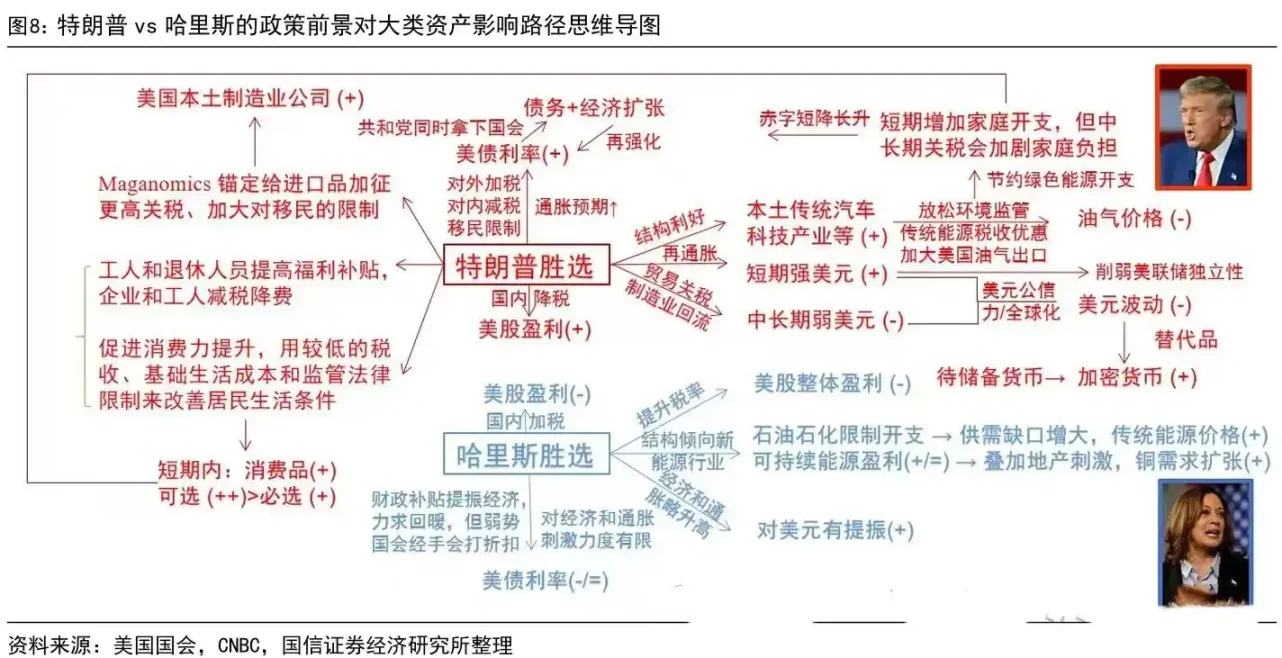
US stocks
Trump's victory is expected to benefit small-cap stocks and certain industries in the U.S. stock market, especially traditional energy, gun manufacturing, private prison operators and small retailers. As Trump prefers low-tax and reduced-regulation policies, which are especially positive for domestic manufacturing, corporate tax cuts and his support for the energy and mining industries may drive small-cap stocks up. The Russell 2000 Index (small-cap benchmark) has already begun to reflect this expectation, rising by about 4% since early October.
If Harris is elected, the market tends to pay attention to her policies of expanding health insurance and Medicaid. Healthcare stocks may benefit, but overall US stocks are under pressure. In addition, the US dollar and US bonds may strengthen in the short term, and the market remains vigilant about possible regulations and corporate tax policies, which may suppress confidence in the overall stock market.
The US Dollar and the Foreign Exchange Market
The expectation of Trump's victory has been reflected in the exchange rate of the US dollar against the Mexican peso, which is considered one of the currencies most affected by Trump's immigration policies. Market volatility has also increased significantly when Trump's election prospects have improved, with the MSCI Latin American Currency Index falling more than 3%, while the US dollar has strengthened significantly after Trump's statement on import tariffs on Mexican goods.
If Harris wins, the dollar may remain relatively strong in the short term, especially as the Fed is expected to remain prudent in its interest rate decisions. If economic policies promote long-term fiscal stimulus, the medium-term volatility of the dollar may remain moderate, and the pressure on emerging market currencies such as Latin America will be reduced.
Oil and Copper
If Trump wins, traditional energy industries (such as oil and fossil fuels) may rise due to Trump's supportive policies. Trump's energy policies tend to reduce regulations and support domestic mining and fossil fuel use, which will have a positive impact on related markets.
Harris is inclined to adopt stricter policies on environmental protection and climate policy, which may bring certain medium- and long-term pressure on oil. Metals such as copper may benefit from the expected demand growth brought about by green infrastructure construction, but the market needs to be vigilant about the potential supply chain pressure brought about by tax increase policies and environmental protection policies.
US Treasury Bonds
Trump's victory is a short-term positive for US bonds. In the interest rate and bond markets, market analysts said that smart money has begun to pay attention to the bond market. The yield of US bonds may rise due to the expectation of Trump's victory. In the long run, under the influence of fiscal expansion and inflation risks, US bonds may face greater selling pressure.
But if Harris wins the election, the U.S. bond market may show "short short and long long" in the short term. Short-term selling pressure may be exacerbated by interest rate expectations or the shift of funds to risky assets, but in the long run, the demand for bonds may be supported due to lower expected inflation.
gold
As the most traditional inflation hedging tool, gold seems to continue to rise regardless of who wins the election. Analysts generally believe that the US government debt problem will continue to expand and will be diluted through inflation. Therefore, gold and Bitcoin have become the main choices for investors to hedge against inflation. Gold, due to its safe-haven properties, will attract investors to cope with the potential depreciation pressure of the US dollar and economic uncertainty.
However, analysts at Standard Chartered Bank pointed out that gold is more likely to rise after Trump's victory, as the market generally expects more fiscal spending after Trump's victory, which will drive inflation in the short term and further increase demand for gold.
The "hero" of the crypto world, what has Trump done in the crypto world?
Once upon a time, Trump was a staunch opponent of cryptocurrency. In early 2019, while still in office, Trump publicly criticized Bitcoin and other cryptocurrencies, saying they were "empty value" and believed that crypto assets could be used as tools for illegal activities. He said Bitcoin was "not a currency" and was extremely volatile.
After leaving the White House, Trump continued to be reserved in interviews, calling Bitcoin a "scam" and insisting that the U.S. dollar should be the world's only reserve currency. During this period, Trump's attitude towards cryptocurrencies was generally negative. But the NFT trend in 2021 soon began to influence Trump's views.
The story begins in 2022. At that time, the cryptocurrency market was in a "cold winter", many crypto projects were on the verge of bankruptcy, and market confidence was low. At this time, Trump's long-term adviser Bill Zanker appeared in his life and brought a suggestion to change Trump's mind: issuing Trump-themed NFTs.
Trump showed unexpected interest in this - however, he did not like the term "NFT", preferring to call it "digital trading cards." Although it seemed strange, these cards were very popular, priced at $99 each, and were almost sold out after they were released. Trump's NFT actually allowed the former president to "stand in front of crypto people" for the first time, not only bringing him tens of millions of dollars in income, but also allowing him to discover a new and powerful support group.
As a result, Trump's attitude towards encryption has completely reversed in the past few years.
November 1, 2024 is the 16th anniversary of the release of the Bitcoin white paper. Trump tweeted his blessing for Bitcoin and said that if elected, he would end the Harris administration's crackdown on cryptocurrencies and even called on supporters to help him realize his vision of "Bitcoin Made in America." At this point, he is no longer an opponent or even just a bystander, but a "presidential candidate" of crypto advocates.
The most iconic event was his attendance at the Bitcoin 2024 conference in Nashville, where Trump announced that he would become a staunch supporter of cryptocurrency. He even understood the biggest pain points in the crypto community and promised to fire current SEC Chairman Gary Gensler and replace him with a "regulator who understands crypto."
He bluntly stated that "opposition to encryption is a wrong policy" and that he would make the United States a "Bitcoin superpower" and hoped to lead the development of the global encryption industry through a more friendly regulatory environment. He even praised Bitcoin as the core of the modern economy, saying that if Bitcoin is to "go to the moon" in the future, he hopes that the United States can become the leader.
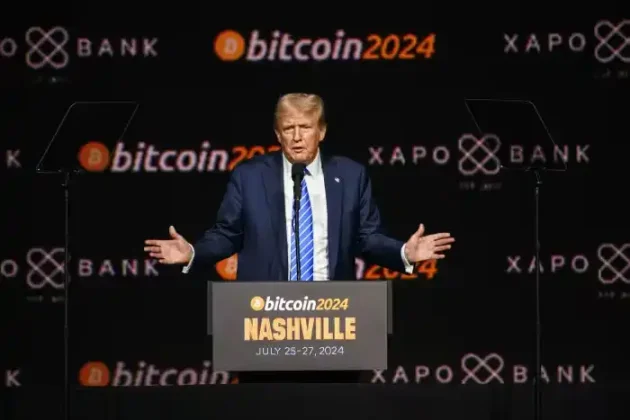
Trump attended the Bitcoin 2024 conference. Source: WSJ
In his speech, Trump tried his best to contrast himself with the Democratic Party's strict stance on cryptocurrencies, especially comparing himself with Elizabeth Warren, who is known for crypto regulation. He also pointed out that if elected, he would create a "Presidential Cryptocurrency Advisory Committee." Trump's statement immediately triggered warm applause and cheers from the audience. Even more shocking, he also proposed that the market value of Bitcoin may surpass gold in the future, and publicly criticized the anti-crypto policies of the Biden and Harris administrations.
During the conference, Trump seemed to have experienced a "public awakening". He was no longer the former president who was skeptical of cryptocurrencies, but became a defender of Bitcoin and the free market. The audience was infected by his change of attitude and regarded him as a "hero" in the crypto circle.
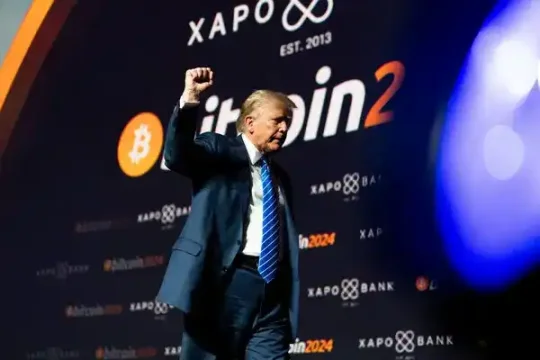
Trump attended the Bitcoin 2024 conference. Source: The New York Times
Another detail behind this transformation reveals the subtle connection between Trump and cryptocurrency. At the conference, he looked at the crypto supporters in the crowd and mentioned that Bitcoin had risen 3,900% during his last presidency, from less than $1,000 to more than $30,000. His speech not only ignited the audience, but also won the support of Bitcoin industry giants, such as Elon Musk, twin brother Winklevoss, and Marc Andreessen, founder of venture capital giant A16Z, all expressed support for his crypto policy.
In addition to Bitcoin itself, Trump has gradually realized the important role of Bitcoin mining in the United States' energy security and economic sovereignty. In June 2024, he met with executives from several large Bitcoin mining companies in the United States and promised to strongly support cryptocurrency mining activities in terms of policy. He even posted on the Truth Social platform that Bitcoin mining is the "last line of defense" against central bank digital currency (CBDC) and hopes that "all remaining Bitcoins will be made in the United States." In Trump's view, Bitcoin mining is not just an economic activity, it also symbolizes the United States' will to fight against the central bank.
In September, Trump bought a cheeseburger with Bitcoin at PubKey, a Bitcoin-themed bar in New York. This move also promoted the possibility of pulling Bitcoin back from a financial investment product to a daily trading currency, and became a symbol of his crypto stance.
Trump also made a bigger promise to the crypto community, not only publicly stating that he would keep a strategic reserve of Bitcoin, but also planning to pardon Rose Ulbricht, who was sentenced to life imprisonment for operating a dark web platform. Through these radical measures, Trump successfully made himself the "savior" of the crypto community. He promised to protect Bitcoin from excessive government regulation and to make the United States the center of global cryptocurrency.
Amid the suspense of whether Trump will return to the White House, the future of Bitcoin and the entire crypto market seems to be at a crossroads. In the past few years, political turmoil, policy changes, and global economic uncertainty have pushed Bitcoin step by step to new heights. If Trump comes to power again, his support for cryptocurrencies may undoubtedly trigger a new frenzy in the market, bringing Bitcoin to new heights and even reshaping the financial landscape of the United States.

















